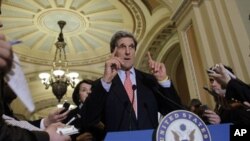A U.S.-Russian nuclear arms reduction pact has cleared a hurdle towards ratification by the U.S. Senate. The chamber authorized a final vote on the treaty, which could come as early as Wednesday.
The 67 to 28 procedural vote easily surpassed the three-fifths majority needed to end debate as well as the two-thirds majority that will be needed to ratify the New START treaty in the 100-member Senate. The pact would limit U.S. and Russian long-range nuclear warheads and delivery systems.
Opposing Republicans continue to blast New START as flawed and counter to U.S. national security interests. Senator Lindsey Graham of South Carolina says the treaty will derail America's decades-old goal of deploying an effective missile defense system.
"It is not like I do not see the value of a treaty. I do. The problem I have with this treaty is that the Russians are saying to anybody who will listen that if we [the U.S.] go to full missile defense and deployment, they are going to withdraw from the treaty. My big fear is that we are giving the Russians a veto," he said.
Not so, according to Democrat John Kerry, chairman of the Senate Foreign Relations Committee. "Just because you say something does not make it true. Our friends on the other side of the aisle [Republicans] seem to have a habit of repeating things that have been completely refuted by every fact that there is," he said.
Kerry says, in addition to a united Democratic caucus, there are enough Republican votes in favor of New START for ratification this week.
Republican opponents have yet to concede the battle. But their statements seem to signal an acknowledgment that the treaty does appear to have the support for passage. Senator Graham, who wants to delay a vote until January, said "I just do not understand why we can not wait five more weeks, because five weeks from now, there will be a better treaty for America negotiated than the one we are about to pass," he said.
Treaty supporters say Republican calls for delay and alterations aim to kill the pact, not improve it. Changes would send New START back to Moscow for approval and Russia's foreign minister has warned against rewriting the treaty.
A key Republican backer, Senator Richard Lugar of Indiana, said the true danger lies in having no nuclear verification treaty at all between Washington and Moscow. "Every senator should ponder today, that we have zero on-the-ground [nuclear] verification capability for Russian strategic forces given that START I expired on December 5, 2009," he said.
New START is one of many contentious items to reach the Senate floor during an unusually busy post-election, end-of-year session. The flurry of legislative activity comes days before the arrival of a new Congress that will see increased Republican numbers in both houses.








